As a pickle lover, I have often wondered whether pickles ever expire. Pickles are a popular snack and a great accompaniment to sandwiches. They are also widely used in cooking, adding flavor and texture to various dishes.
However, despite their popularity, many people are unsure about the shelf life of pickles and whether they are safe to eat after a certain point.
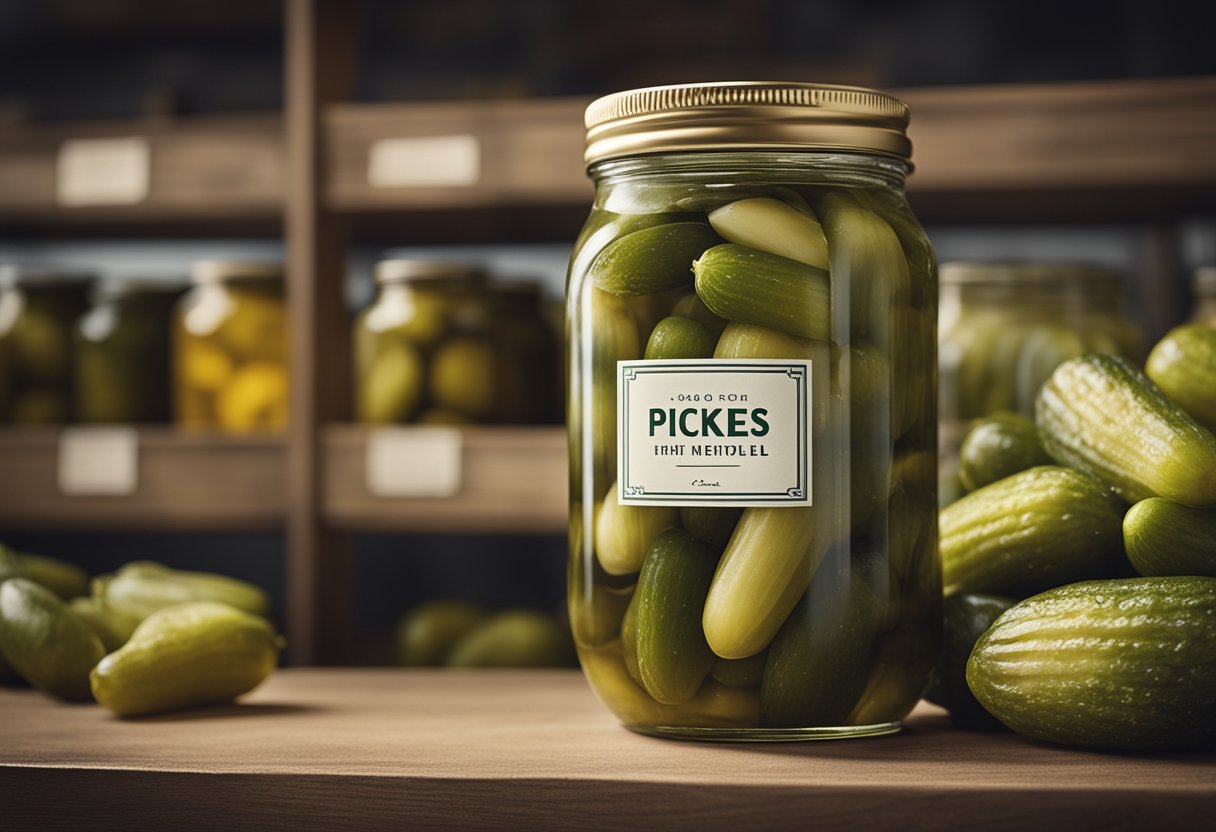
Understanding the shelf life of pickles is important to ensure that they are safe to eat and taste good. Pickles are made by fermenting cucumbers in vinegar, salt, and water. This process preserves the cucumbers and gives them their characteristic sour taste.
However, pickles can go bad if they are not stored properly or are past their expiration date. In this article, I will explore the shelf life of pickles, how to store them, and how to tell if they have gone bad.
Key Takeaways
- Pickles can expire if they are not stored properly or are past their expiration date.
- Proper storage is important to ensure that pickles remain safe to eat and taste good.
- Signs of spoilage in pickles include changes in color, texture, and odor.
Understanding Pickles
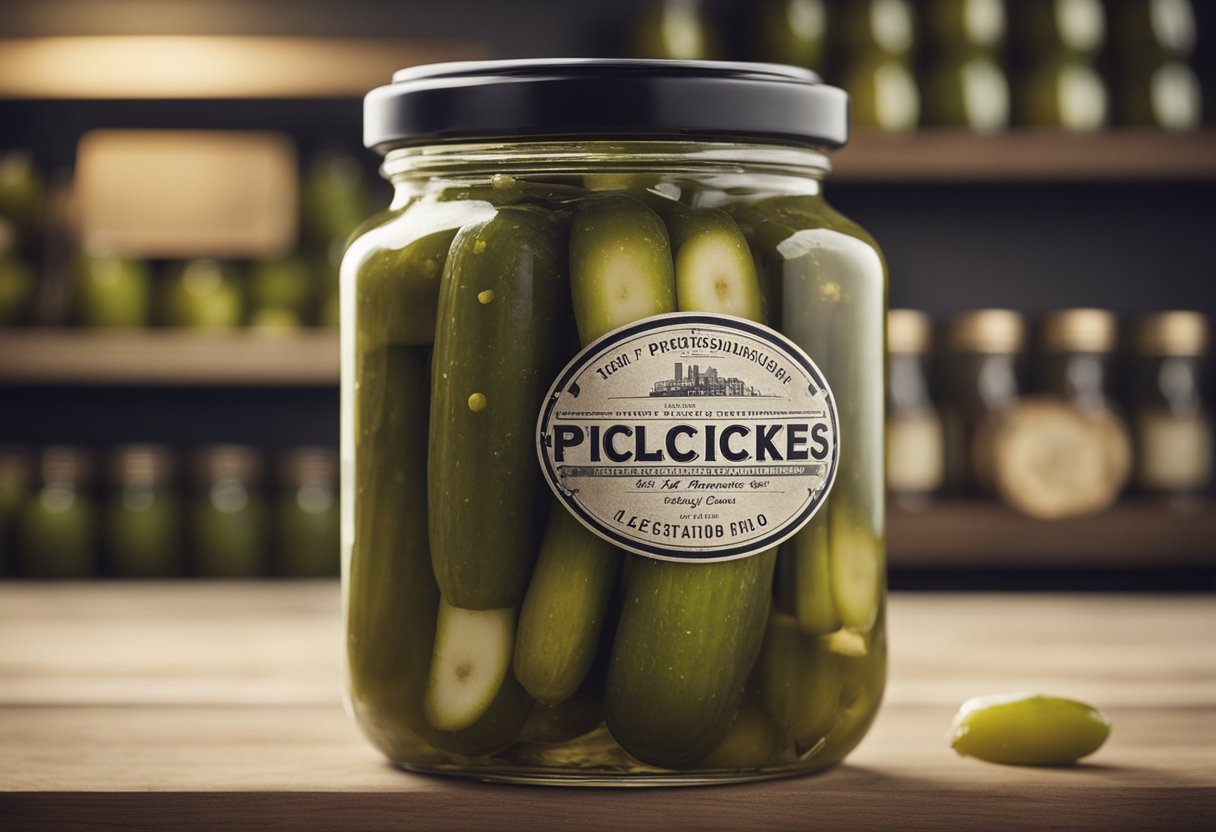
As someone who enjoys pickles, I think it’s important to understand what pickles are and how they are made. Pickles are cucumbers that have been preserved using various methods such as fermentation or pickling in a salty brine or vinegar solution.
The pickling process involves submerging cucumbers in a mixture of salt, water, and vinegar or an acidic solution.
The acidic solution or vinegar helps to preserve the cucumbers and give them a sour taste. The salty brine also helps to preserve the cucumbers by inhibiting the growth of bacteria that causes spoilage.
Fermented pickles, on the other hand, are made by submerging cucumbers in a salty brine solution and allowing the natural bacteria on the cucumbers to ferment the sugars in the cucumbers.
This process results in a tangy and sour flavor that is characteristic of fermented pickles.
The pickling process can also involve adding spices and herbs to the brine to give the pickles a unique flavor. Some common spices used in pickling include dill, garlic, and mustard seeds.
It’s important to note that pickles do have an expiration date, and it’s important to check the label to ensure that you are consuming pickles that are still safe to eat.
While pickles can last for a long time due to the preserving process, they can still spoil if not stored properly or if they are past their expiration date.
Overall, pickles are a delicious and versatile food that can be enjoyed on their own or used as a condiment in sandwiches and salads. Understanding the pickling process and how pickles are made can help you appreciate this tasty treat even more.
The Shelf Life of Pickles
As someone who enjoys pickles, it’s important to know how long they can last for. The shelf life of pickles can vary depending on various factors, including how they are stored and whether they are opened or unopened.
Unopened jars of pickles that are shelf-stable can typically last for up to two years past their labeled expiration date, according to the experts at Healthy Canning.
However, it’s important to note that this expiration date is often misleading, and pickles can actually last much longer than that if they are properly stored.
Once a jar of pickles is opened, its shelf life can be significantly shorter. Pickles that are stored in the fridge after opening can typically last for one to three months, according to Home Cook World.
It’s essential to check the pickles before eating them, even if they are within their expiration date.
It’s important to note that the shelf life of pickles can vary depending on the type of pickle. For example, homemade pickles may not last as long as store-bought pickles due to differences in preparation and storage.
Additionally, pickles that are not properly sealed or stored can spoil more quickly.
In summary, the shelf life of pickles can vary depending on several factors, including whether they are opened or unopened, how they are stored, and the type of pickle. It’s important to check the pickles before eating them and to store them properly to ensure their freshness.
Storage of Pickles
As a pickle lover, I always want to make sure that my pickles are stored properly to maintain their quality and taste.
Proper storage can also help extend the shelf life of pickles. Here are some tips on how to store pickles:
- Refrigerate after opening: Once you open a jar of pickles, it is important to store it in the refrigerator. This will help preserve the flavor and texture of the pickles. Additionally, storing pickles in the refrigerator can help prevent the growth of bacteria that can cause spoilage.
- Store in a cool, dry place: If you have unopened jars of pickles, it is best to store them in a cool, dry place such as a pantry or cupboard. Make sure the area is away from direct sunlight and heat sources. Exposure to heat and light can cause the pickles to spoil faster.
- Reseal the jar tightly: When storing pickles, it is important to make sure the jar is tightly sealed. This will help prevent air from getting in and causing the pickles to spoil. If the jar is not tightly sealed, the pickles may become dry and lose their flavor.
- Use proper food storage containers: If you have homemade pickles, it is important to store them in proper food storage containers. Glass jars with airtight lids are a good option. Plastic containers can also be used, but make sure they are BPA-free and designed for food storage.
In summary, pickles should be stored in a cool, dry place away from direct sunlight and heat sources. Once opened, pickles should be stored in the refrigerator and the jar should be tightly sealed.
By following these storage tips, you can enjoy delicious pickles for a longer period of time.
Pickles and Bacteria
As with any food, pickles can be subject to bacterial growth if not stored properly. The good news is that pickles are naturally resistant to harmful bacteria due to the acidic nature of the brine.
According to the USDA, pickles with a pH level of 4.6 or lower are considered safe for consumption.
However, it’s important to note that not all bacteria are bad. In fact, there are many types of bacteria that are beneficial to our health and can even aid in digestion.
The harmful bacteria that we need to be aware of when it comes to pickles include botulism, which can cause foodborne illness and even be fatal in some cases.
To prevent the growth of harmful bacteria in pickles, it’s important to store them properly. Refrigerated jars should be kept at 40°F or colder and kept clean and tightly shut. Mold growth can also be prevented by submerging pickles in brine.
It’s important to note that pickles do have an expiration date. An unopened jar of pickles can last for up to one year from the date of purchase when stored in the pantry.
Once opened, pickles should be refrigerated to preserve their freshness and can last for several months. However, if you notice any signs of mold or a foul odor, it’s best to discard the pickles.
Signs of Spoilage in Pickles
As with any food, pickles can go bad and spoil over time. It’s important to know the signs of spoilage to avoid getting sick from consuming bad pickles. Here are some signs to look out for:
Texture
Spoiled pickles may have a slimy texture, which is a clear indication that they have gone bad. If the pickles have lost their crunchiness and become soft or mushy, it’s a sign that they are no longer fresh.
Smell
One of the most obvious signs of spoilage in pickles is a sour or rancid smell. If the pickles smell off or have an unpleasant odor, it’s best to discard them.
Cloudy Brine
If the brine in the jar is cloudy, it’s a sign that the pickles have gone bad. A clear brine is a sign that the pickles are still fresh.
Discoloration
If the pickles have changed color, it’s a sign that they have gone bad. The pickles may have turned brown or black, or they may have developed mold on the surface.
Signs of Spoilage
Other signs of spoilage in pickles include bulging jars or fizzing brine. These are signs of unstable or out-of-control fermentation, which means the pickles are unsafe to consume. If the jar or lid has bulged, discard the pickles. Ditto if the liquid fizzes.
In conclusion, it’s important to check the quality of pickles before consuming them. Signs of spoilage include changes in texture, smell, and color, as well as cloudy brine and bulging jars. If you notice any of these signs, it’s best to discard the pickles to avoid getting sick.
Proper Handling of Pickles
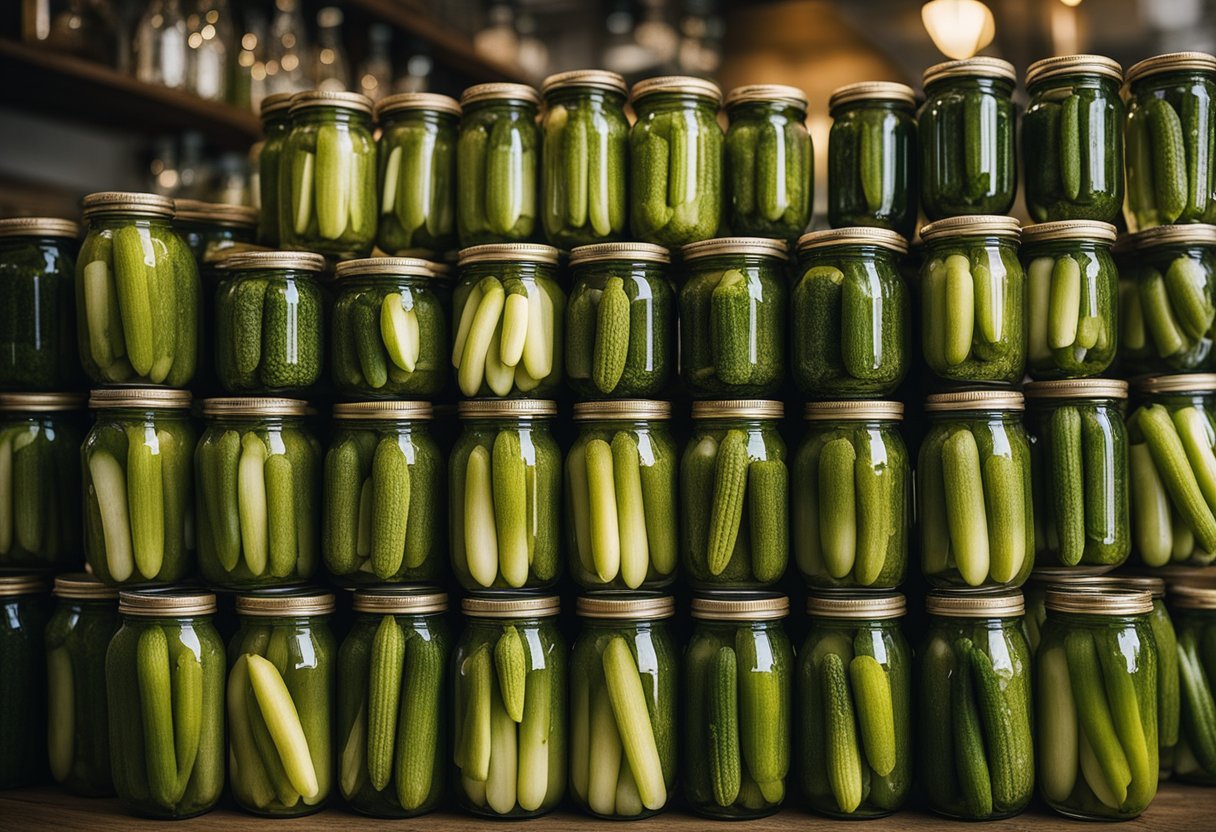
As someone who loves pickles, I know how important it is to handle them properly to keep them fresh and safe to eat.
Here are some tips for proper handling of pickles:
- Opening the Jar: When opening a jar of pickles, it’s important to use a clean utensil to avoid contaminating the pickles with bacteria from your fingers. If you use your fingers, make sure they are clean and dry.
- Storing Opened Pickles: Once you’ve opened a jar of pickles, it’s important to store them properly to keep them fresh. Make sure the pickles are fully submerged in the brine, and keep the jar tightly sealed. Store the jar in the refrigerator and use the pickles within a few weeks.
- Inspecting the Pickles: Before eating a pickle, inspect it for any signs of spoilage. If the pickle has a strange odor, a slimy texture, or a bulging lid, it may be spoiled and should be discarded.
- Using Clean Utensils: When serving pickles, make sure to use clean utensils to avoid contaminating the pickles with bacteria. If you’re serving pickles at a party, it’s a good idea to have multiple utensils available to avoid cross-contamination.
By following these tips, you can ensure that your pickles stay fresh and safe to eat. Remember to always handle pickles with care to avoid spoiling them or making yourself sick.
Pickles in Cooking
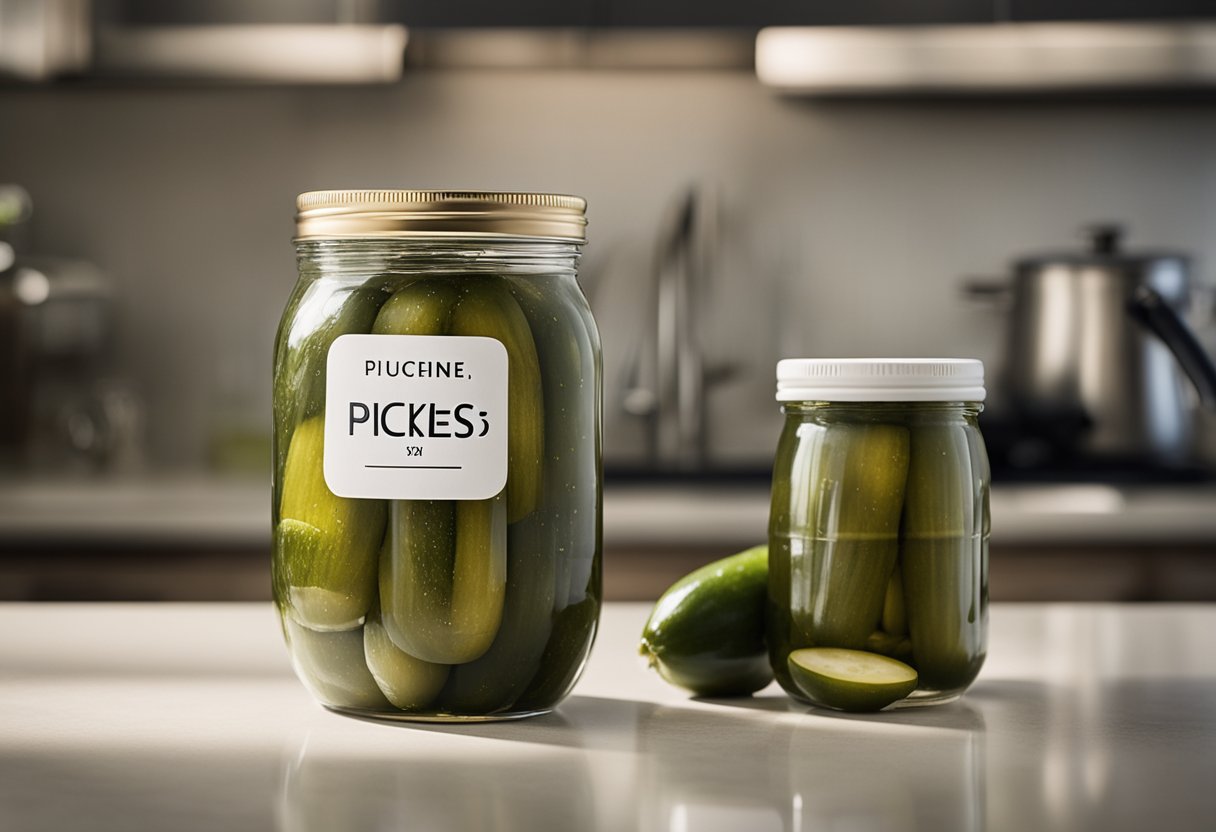
I love using pickles in my cooking because they add a tangy and flavorful punch to any dish. Whether you’re looking to add some crunch to a sandwich or spice up a recipe, pickles are a versatile ingredient that can be used in many different ways.
One of my favorite ways to use pickles is as a snack. Dill pickles are a classic snack that can be enjoyed on their own or paired with other foods like cheese or crackers. They are also a great addition to a party platter or charcuterie board.
Pickles are also a great addition to sandwiches. Whether you’re making a classic deli sandwich or a grilled cheese, adding pickles can take your sandwich to the next level.
The acidity of the pickles can cut through the richness of the cheese and add a bright, fresh flavor to the sandwich.
If you’re looking to make your own pickles, there are many recipes available for homemade pickles. Refrigerator pickles are a popular option because they are quick and easy to make.
Simply slice your cucumbers, add them to a jar with vinegar, water, and spices, and let them sit in the refrigerator for a few hours or overnight. You’ll have delicious homemade pickles in no time.
Pickles are also a key ingredient in some traditional fermented foods like kimchi and sauerkraut. These foods are made by fermenting vegetables in a salty brine, which creates a tangy, sour flavor.
If you’re interested in making your own fermented foods, there are many recipes available online.
Overall, pickles are a versatile and delicious ingredient that can be used in many different ways. Whether you’re snacking on them, adding them to a sandwich, or using them in a recipe, pickles are sure to add a flavorful punch to any dish.
The Transformation of Pickles
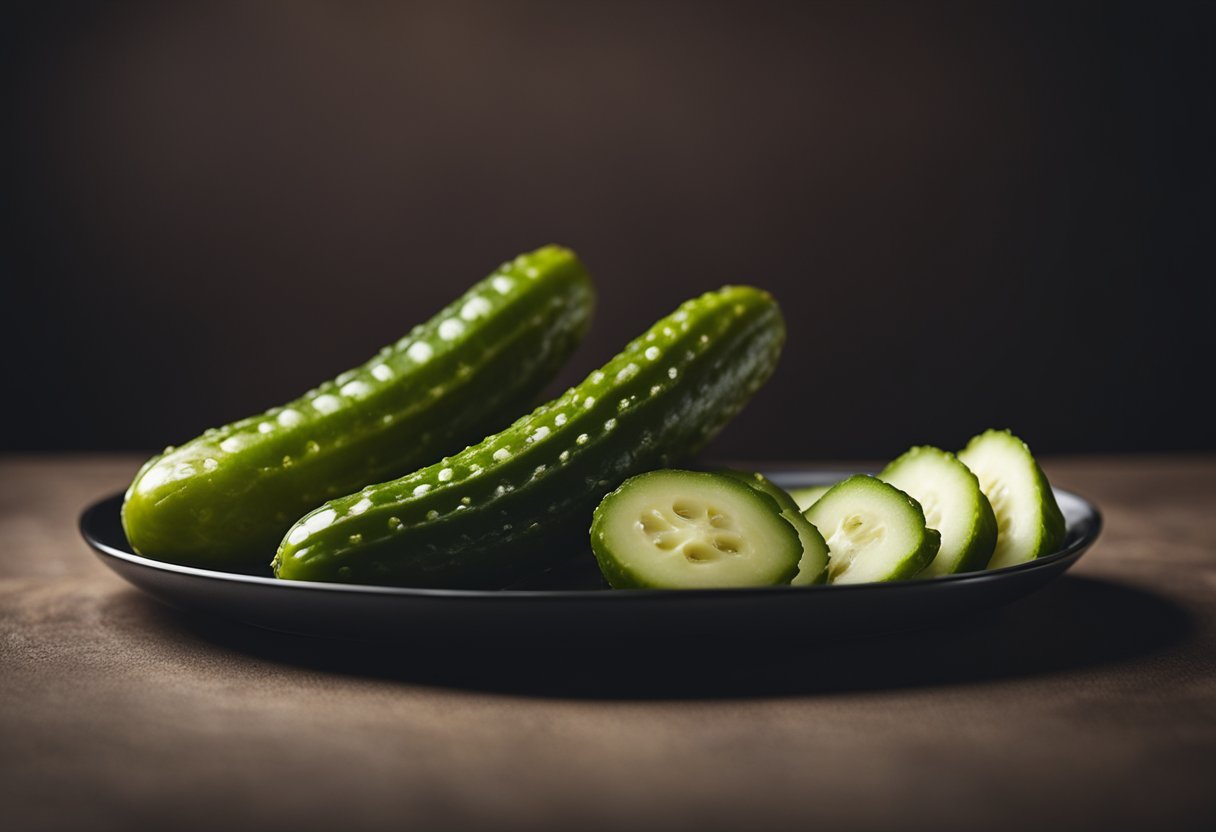
As a pickle lover, I have always been fascinated by the transformation that pickles undergo. Pickles are cucumbers that have been transformed through the fermentation process.
This process involves the use of salt, vinegar, and other spices to create a tangy and satisfying crunch that is so loved by many.
During the fermentation process, the natural bacteria on the cucumbers are allowed to grow and multiply, breaking down the sugars and converting them into lactic acid. This process gives pickles their signature sour taste and also helps to preserve them for a longer period.
The transformation of pickles is not just limited to their taste. The texture of pickles also changes during the fermentation process. As the cucumbers are left to sit in the brine, they become softer and more pliable, making them easier to bite into.
Pickles are also transformed in terms of their nutritional value. Fermented pickles are rich in probiotics, which are beneficial bacteria that help to improve gut health. They are also a good source of vitamin K, which is important for healthy bones and blood clotting.
In conclusion, the transformation of pickles is a fascinating process that results in a tangy and satisfying snack that is loved by many. From the fermentation process to the changes in texture and nutritional value, pickles are a true delight for the taste buds and the body.
Safety Measures for Pickles
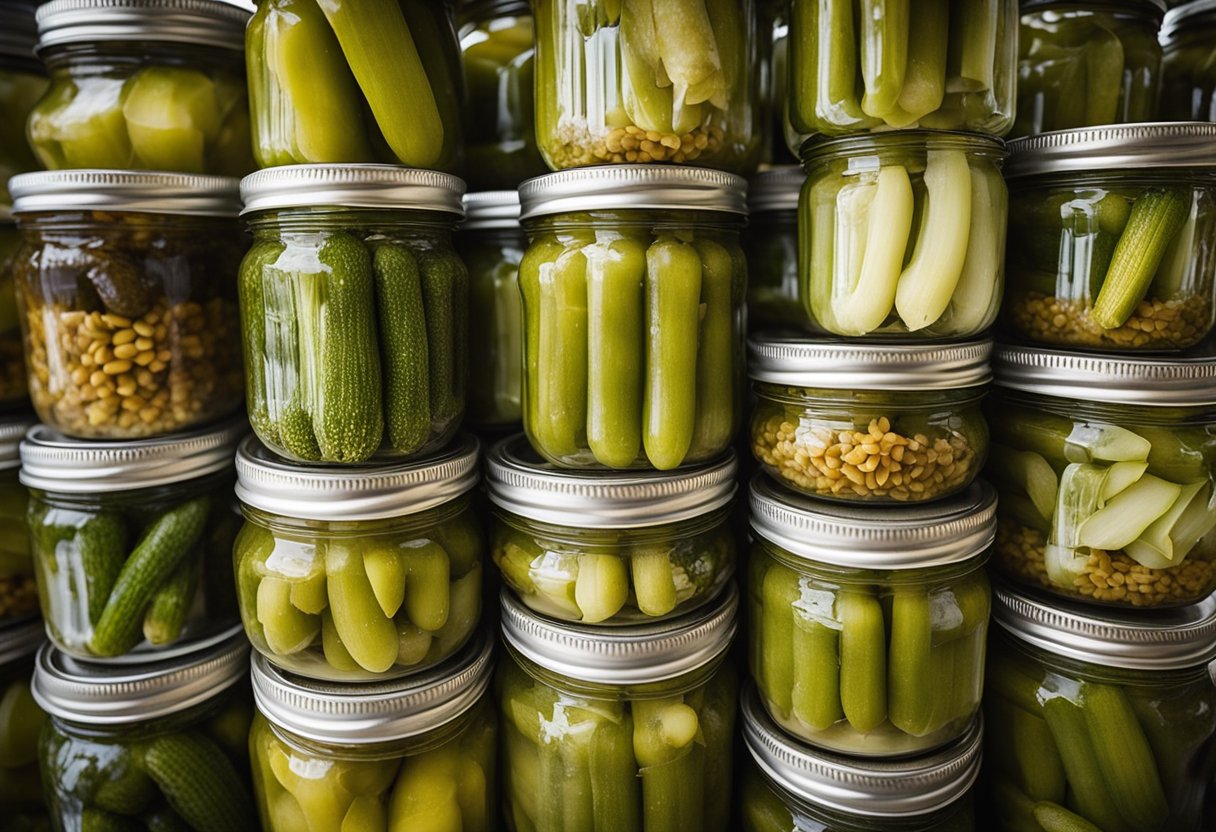
As a pickle lover, I always make sure to follow safety measures when it comes to storing and consuming pickles. Here are some tips to keep in mind:
Check for signs of spoilage
Before consuming pickles, it is important to check for any signs of spoilage. This includes mold on the pickles or in the brine, bulging jars, or fizzing brine. If you notice any of these signs, the pickles have gone bad and should be discarded immediately.
Store pickles properly
To ensure the longevity of pickles, it is important to store them properly. Unopened jars of pickles can be stored in a cool, dry place such as a pantry. Once opened, pickles should be stored in the refrigerator.
Understand expiration dates
While pickles have a long shelf life, it is important to pay attention to expiration dates. However, it is important to note that expiration dates are not always accurate.
As long as the jar is intact and the pickles have been stored properly, they can last beyond their expiration date.
Use healthy canning practices
If you are making homemade pickles, it is important to use healthy canning practices. This includes using clean jars and lids, properly sanitizing the jars, and processing them in boiling water for the recommended amount of time.
Be aware of perishability
Pickles are a perishable food item and should be consumed within a reasonable time frame. While they may last beyond their expiration date, it is important to use your best judgment and discard any pickles that appear to have gone bad.
By following these safety measures, you can enjoy delicious and safe pickles.
The Market for Pickles
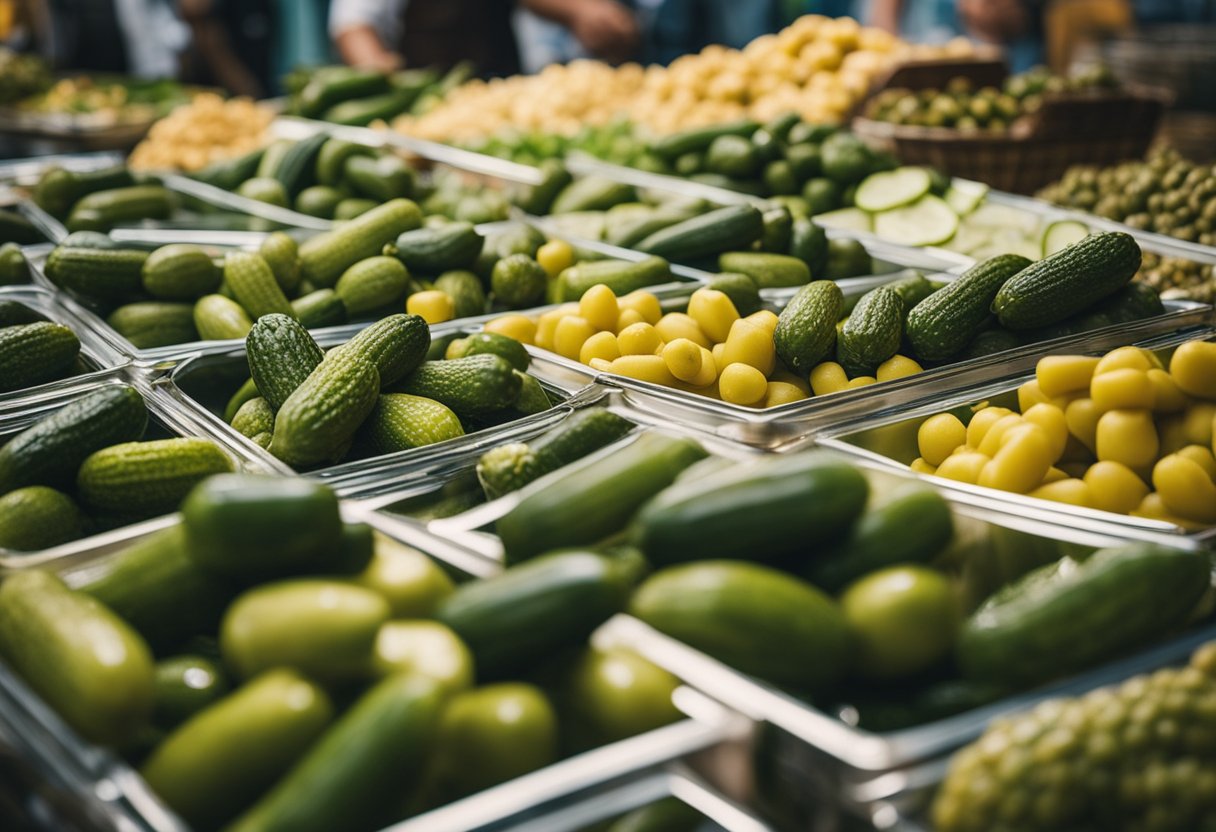
As someone who enjoys pickles, I am always curious about the market for these delicious treats. Pickles are a popular food item and can be found in almost every grocery store.
They are typically sold in jars or cans and are available in a variety of flavors and sizes.
Canned pickles are a common sight in grocery stores. They are a convenient option for those who want to stock up on pickles without having to worry about them spoiling.
Canned pickles have a long shelf life and can last for up to a year when stored in the pantry. However, once the can is opened, the pickles should be refrigerated to preserve their freshness.
In addition to canned pickles, there are also refrigerated pickles available in grocery stores. These pickles are typically sold in jars and are kept in the refrigerated section of the store.
Refrigerated pickles have a shorter shelf life than canned pickles and should be consumed within a few weeks of opening.
The market for canned foods, including pickles, has been steadily growing over the years. Canned foods are a popular option for those who want to stock up on food items that have a long shelf life.
According to a report by Grand View Research, the global canned food market size was valued at USD 91.4 billion in 2020 and is expected to grow at a compound annual growth rate (CAGR) of 3.7% from 2021 to 2028.
Overall, the market for pickles is strong and continues to grow. Whether you prefer canned or refrigerated pickles, there are plenty of options available in grocery stores. So next time you’re at the store, be sure to stock up on your favorite pickles!
Also, read some similar posts:
Frequently Asked Questions
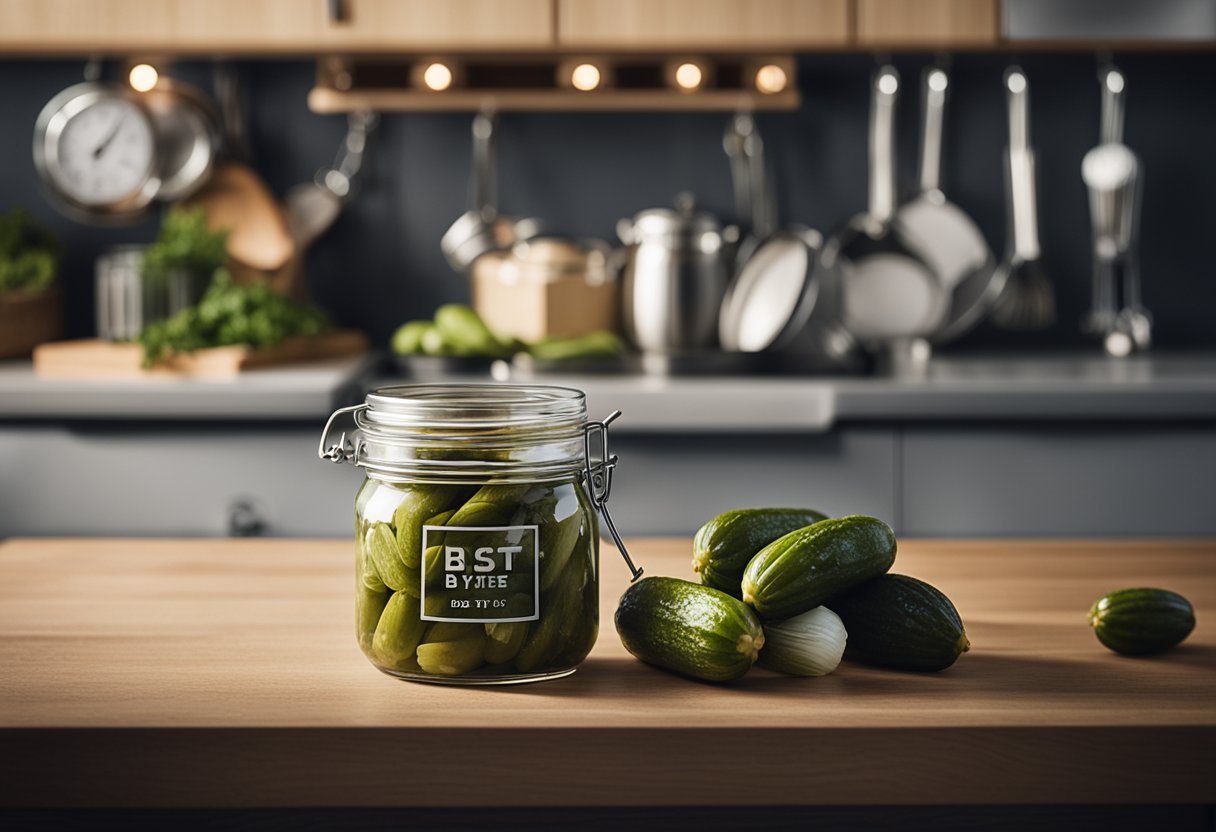
How long do pickles last once opened?
Once opened, pickles can last for several months in the refrigerator if stored properly. According to Bricks Chicago, pickles usually have a shelf life of 1-2 years from the date of manufacturing. However, the quality and taste may deteriorate over time.
Do unopened dill pickles go bad?
Unopened dill pickles can last for a long time, even beyond their expiration date, as long as they are stored correctly. According to Home Cook World, canned pickles can last well beyond their expiration date, as long as the jar is intact and they have been stored correctly.
How to tell if pickles are bad?
There are several signs that pickles have gone bad. According to The Kitchn, spoiled pickles will smell bad and unpleasantly sour. If the smell makes you recoil or is foul, the jar has gone bad.
Discolored pickles or brine can also be a sign of spoilage. If the pickles themselves and the brine are discolored and/or cloudy, the jar has gone bad.
What happens if you eat expired pickles?
Eating expired pickles can lead to food poisoning and other health issues. According to Fitibility, consuming expired pickles can cause nausea, vomiting, diarrhea, and other digestive problems.
It is always best to check the expiration date and the quality of the pickles before consuming them.
How long do homemade pickles last in the fridge?
Homemade refrigerated pickles can last at least three to four weeks in the fridge, according to Epicurious. Any longer and the quality will start to decline.
Can you eat 20 year old pickles?
It is not recommended to eat 20-year-old pickles or any food that has been stored for that long. According to Bricks Chicago, pickles usually have a shelf life of 1-2 years from the date of manufacturing. After that, the quality and taste may deteriorate over time.
